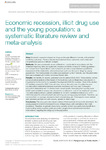Mostrar o rexistro simple do ítem
Economic Recession, Illicit Drug Use and the Young Population: a Systematic Literature Review and Meta-Analysis
| dc.contributor.author | Casal, Bruno | |
| dc.contributor.author | Rivera, Berta | |
| dc.contributor.author | Costa Storti, Claudia | |
| dc.date.accessioned | 2024-01-12T17:52:24Z | |
| dc.date.issued | 2023 | |
| dc.identifier.citation | Casal B, Rivera B, Costa-Storti C. Economic recession, illicit drug use and the young population: a systematic literature review and meta-analysis. Perspectives in Public Health. 2023;X(X). doi:10.1177/17579139231180751 | es_ES |
| dc.identifier.issn | 1757-9139 | |
| dc.identifier.uri | http://hdl.handle.net/2183/34890 | |
| dc.description.abstract | [Abstract] Aims: Economic recessions impact on drug use through different channels, with potential conflicting outcomes. Previous studies have reached mixed outcomes, and a clear and comprehensive picture is difficult to depict. Methods: We use a systematic review of literature – conducted in accordance with the Preferred Reporting Items for Systematic Reviews and Meta-Analysis (PRISMA) guidelines – and a hierarchical mixed-effects meta-analysis to provide a comprehensive quantitative assessment of the relationship between business cycle and the use of drugs by young populations. The heterogeneity of studies was assessed by the I2 statistic, and the publication bias was evaluated with contour-enhanced funnel plots. Results: We identify 25 studies, published over the period 2008–2020. These articles carried out an empirical analysis of the impact of the business cycle on illegal drug consumption in Organisation for Economic Co-operation Development (OECD) countries. Most of the studies (17 studies) covered the 2007 financial crisis. Among the outcomes, 9 studies traced a countercyclical relationship between economic recessions and drug use, 3 showed a procyclical relationship and 13 studies found mixed results. Unemployment was the most widely used variable to assess macroeconomic conditions in most of the studies (21 studies). The meta-analysis shows a partial correlation of .03 (95% confidence interval (CI): .0147–.0453) between the unemployment rate and drug use among young individuals. Therefore, we conclude that, on average, recessions tend to boost drug use. This impact is more marked with cannabis use than it is with cocaine, opioids or other drugs. Conclusion: This study provides robust evidence that in periods of economic downturns, the young populations tend to increase the use of illegal drugs, with cannabis as their main preference. Therefore, in periods of economic severity, society may particularly benefit from implementing widely reaching public prevention programmes and demand reduction interventions, targeting this subgroup of the population. | es_ES |
| dc.description.sponsorship | The author(s) disclosed receipt of the following financial support for the research, authorship and/or publication of this article: This article is part of the research involved in the project funded under the agreement no. CT.20.HEA.0132.1.0. The sole responsibility for the content of this research lies with the authors | es_ES |
| dc.language.iso | eng | es_ES |
| dc.publisher | SAGE | es_ES |
| dc.relation.uri | https://doi.org/10.1177/17579139231180751 | es_ES |
| dc.rights | © Royal Society for Public Health 2023 | es_ES |
| dc.subject | Economic recession | es_ES |
| dc.subject | Drug use | es_ES |
| dc.subject | Young population | es_ES |
| dc.subject | Meta-regression | es_ES |
| dc.title | Economic Recession, Illicit Drug Use and the Young Population: a Systematic Literature Review and Meta-Analysis | es_ES |
| dc.type | info:eu-repo/semantics/article | es_ES |
| dc.rights.access | info:eu-repo/semantics/embargoedAccess | es_ES |
| dc.date.embargoEndDate | 9999-99-99 | es_ES |
| dc.date.embargoLift | 10007-06-07 | |
| UDC.journalTitle | Perspectives in Public Health | es_ES |
| dc.identifier.doi | https://doi.org/10.1177/17579139231180751 |






